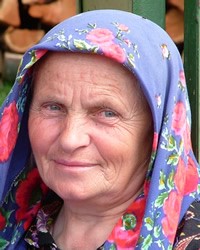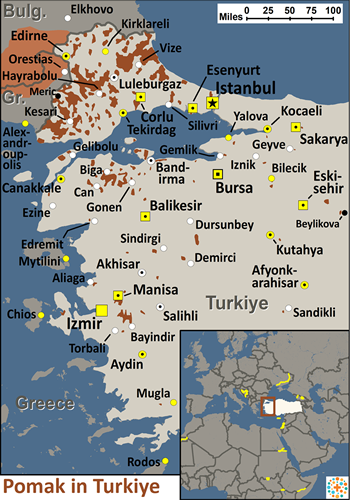The name Pomak means, "people who have suffered." The Pomaks are a Slavic people who live in the Balkan region of southern Europe. Some consider them to be a subgroup of the Bulgarians since they speak a Bulgarian dialect, have Bulgarian physical features, and have cultural practices similar to the Bulgarians. They are distinguished, however, by their non-Bulgarian names and their devotion to Islam rather than to Orthodox Christianity.
The Pomaks probably converted to Islam between the 1300s and the 1600s when the Ottoman Empire ruled the Balkan states. There is still a disagreement whether they only became Muslim to avoid a huge Jizya tax Muslims impose on non-Islamic subjects. Later, the Pomaks sent soldiers to fight alongside the Turkish Ottomans.
Throughout history, they have been considered the outcasts of Bulgarian society. In 1948, the communists removed people they thought to be disloyal to their regime. By 1950, the Pomak people were the new target. Eventually, 30,000 people were moved across the border into northeast Greece and Macedonia, while others immigrated into Romania. The largest Pomak population is in Turkey. It is made up mostly of those who once migrated from Greece.
In Turkey, the Pomak economy is based on agriculture. Their major crops include rye, barley, corn, potatoes, and tobacco. Raising animals such as cows, goats and sheep is also very important. Pomak women are renowned for their excellent weaving abilities. Many Pomaks also earn their income as migrant workers. The Pomak diet primarily comprises bread, potatoes and beans. They also enjoy yogurt, various cheeses, lamb, and goat meat.
Pomak farmers live in villages that are surrounded by their fields and pastures. They constructed their houses out of stone, wood, and clay, with sloping slate roofs. Recently, however, some Pomaks have built homes out of brick or cinder block, with ceramic tile roofs.
Traditionally, Pomak families arranged marriages. They married in their mid to late teens. Before marriage, the bride prepared her own dowry, which included household items and clothing. Although Islamic law allows a man to have four wives, polygamy was never common among the Pomaks.
The Pomaks in Turkey are virtually all Muslim, and their religion makes up an integral part of their ethnic identity. The relative isolation of the Pomaks from other Muslims has allowed the mixing of beliefs to continue unhindered for centuries. Most Pomaks do not perform traditional Islamic practices. Few of them fast during the month of Ramadan like most Muslims. Their language even lacks many religious words vital to the Islamic faith and traditions. Pomaks don't even know about Muslim saints, while they celebrate feast days of various Christian saints. Weddings and other ceremonial occasions often combine Muslim and Christian traditions.
The Pomaks in Turkey have an identity crisis. They faced rejection by the Bulgarians (and their religion), and the Turks (and their language). They need to put their identity in Jesus Christ, the one who loves them unconditionally, and wants them to experience life to the full.
The Pomaks need people who will begin praying for them, tearing down the strongholds that are keeping them in spiritual bondage. Only then will their hearts be prepared to receive the Good News when workers arrive.
Pray the hearts of the Pomak people in Turkey would be stirred to hunger after God.
Pray that family-based movement to Christ will soon transform Pomak society, blessing them spiritually and economically.
Pray for the Lord to move in the hearts of believers to give up their own rights and sacrifice their lives to see the Pomak people blessed by the work of Jesus Christ, the only Savior.
Pray for Pomak decision makers in Turkey to open their communities to Christ's ambassadors.
Scripture Prayers for the Pomak in Türkiye (Turkey).
| Profile Source: Joshua Project |


























